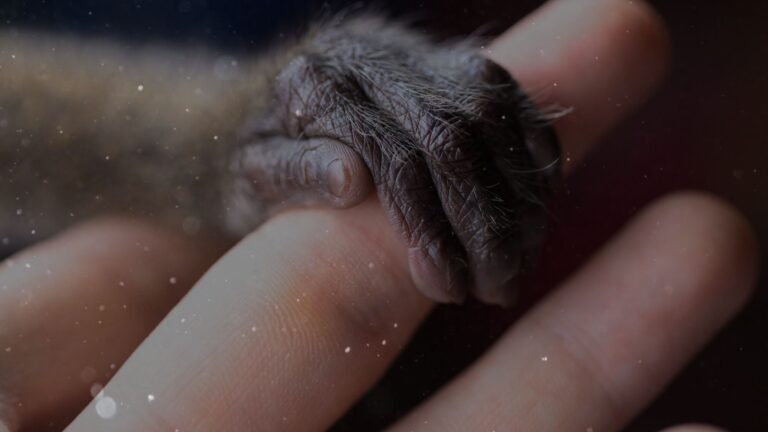Documentation obtained by Animal-Free Science Advocacy (AFSA) under the Freedom of Information Act 1982 (Cth) (FOI Act) has identified an unexpected death of a macaque via strangulation, the holding of macaques significantly beyond the approved holding time, and deviations from approved protocols.
The redacted project reporting documentation relate to a project investigating viral transmission of HIV which commenced in 2018. The research was conducted by University of Melbourne researchers using 26 macaques, under the oversight of the Australian Animal Health Laboratory (AAHL) Animal Ethics Committee (AEC).
The documentation reveals that:
- 25 macaques died as part of the experimental design
- 1 macaque died from strangulation from an enrichment method
- Additional aspects were conducted without approval from the AEC
- The macaques were held longer (12 or 15 months) than the initial protocol approved due to delays in obtaining required antibodies
- Macaques were immunised with a tuberculosis vaccine without approval from the AEC
- Not all planned components of the project were completed
There are uncertainties about what was approved versus what happened. Details are missing about the achievement of project objectives. These uncertainties come from claimed FOI Act exemptions, which have resulted in parts of the project report being redacted.
Based on the redacted documentation, it appears to AFSA that the research was not conducted in accordance with AEC approval. It is unclear to AFSA what actions were taken, if any, in relation to the apparent non-compliance, and what the consequences were, if any, of the identified errors for the research group or the AEC.
In Animal-Free Science Advocacy’s view, there are clear ethical dilemmas with using animals who possess high cognitive abilities and well-developed social structures as mere ‘tools for research’, and there are scientific concerns over the validity of using primates in HIV research. Because HIV and simian immunodeficiency virus (SIV) are closely related viruses, researchers study SIV to learn more about HIV. However, SIV differs from the genetics of HIV by a staggering 50% (2). This is indicative of the failing of 100 different types of HIV vaccines tested in monkeys with positive results, none of which provided protection or therapeutic benefit in humans, due to major differences in SIV-infected macaques compared to HIV-infected humans (3).
In addition to what Animal-Free Science Advocacy considers to be the unnecessary deaths of 26 primates, the released documentation underscores our concerns surrounding lax AEC oversight of animal research.

AFSA spokesperson Rachel Smith states:
‘Whilst it is understood that research projects can be subject to unforeseen delays, when such research involves sentient animals subjected to ongoing confinement, AFSA is gravely concerned that the failings described in the project reporting documentation were by a prominent Australian research group’.
Animal-Free Science Advocacy previously exposed unexpected deaths at the Gippsland primate breeding colony. A current Animal-Free Science Advocacy campaign is highlighting the individual stories of primates used in biomedical research across Australia and calling for an end to taxpayer funded primate research.
ENDS
(1)Australian code for the care and use of animals for scientific purposes, 2021, available at: https://www.nhmrc.gov.au/about-us/publications/australian-code-care-and-use-animals-scientific-purposes
(2) Taylor (2016) Monkeys are still suffering for ineffective HIV research https://www.crueltyfreeinternational.org/what-we-do/blog/monkeys-are-still-suffering-ineffective-hiv-research
(3) Bailey J. Monkey-based research on human disease: the implications of genetic differences. Altern Lab Anim. 2014;42(5):287-317. doi:10.1177/026119291404200504
Animal Ethics Committee (AEC) Code Requirements
AFSA notes that the Australian code for the care and use of animals for scientific purposes (1) relevantly provides:
“…
1.32 All activities…that involve the care and use of animals for scientific purposes must:
…
- be conducted in accordance with AEC approval.
2.3.2 The AEC must:
…
- take appropriate actions regarding non-compliance
…
2.3.25 When projects or activities that are in breach of the Code are detected, the AEC must ensure that:
- actions are taken to ensure that animal wellbeing is not compromised, the issue is addressed promptly, and activities that have the potential to adversely affect animal wellbeing cease immediately (see Clauses 5.2 and 5.4). Actions may include suspending or withdrawing approval for the project or activity
- actions are taken to address the issues in consultation with the person(s) involved
- when considered necessary, such matters are referred to the institution for action
- non-compliance receives appropriate follow-up.
…”
